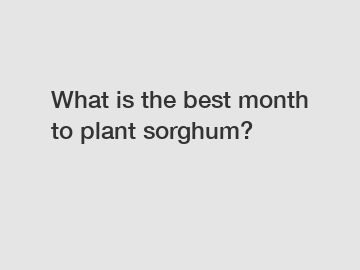What is the best month to plant sorghum?
Sorghum, a resilient and versatile grain crop, has gained significant popularity among farmers and gardeners worldwide. Known for its multiple uses, from producing livestock feed to human consumption and biofuel, it's no surprise that many agricultural enthusiasts are eager to learn the best time to plant sorghum. In this article, we will explore various factors that affect sorghum growth, enabling you to make an informed decision about the optimal month for planting this remarkable crop.
Understanding Sorghum's Growing Cycle:
Before diving into the best time to plant sorghum, it is crucial to comprehend the plant's lifecycle. Sorghum is a warm-season crop that requires temperatures above 60°F to germinate successfully. It thrives in regions with a long growing season, moderate rainfall, and plenty of sunshine. For optimal growth, sorghum typically requires 90-120 days from sowing to harvest.

1. Seasonal Considerations:
To determine the best month for sorghum planting, you must consider your geographical location and the climatic conditions prevalent in your region. While sorghum can adapt to a broad range of climates, it performs best when temperatures consistently stay above 60°F. If your area experiences chilly springs, consider planting sorghum after the last frost date when soil temperatures have warmed up sufficiently.
2. Soil Preparation and Warmth:
a. Soil Type and pH:
Sorghum prefers well-drained, loamy soil with a pH range of 5.5-7.5. Ensure your soil is well-prepared by incorporating organic matter, like compost or aged manure, to improve its fertility and water-holding capacity. Conduct a soil test to determine its pH and make necessary amendments accordingly.
b. Soil Temperature and Moisture:
For optimal germination, the soil temperature should be at least 65°F. Planting sorghum when the soil reaches this temperature ensures the seeds sprout quickly and uniformly. If your soil is too cold, consider waiting until the temperature rises to avoid poor germination rates and uneven growth. Additionally, ensure good soil moisture during the planting process to aid in seedling establishment.
3. Choosing the Right Sorghum Varieties:
The best month for planting sorghum may also depend on the specific variety you choose. Numerous sorghum cultivars, such as grain sorghum, forage sorghum, and sweet sorghum, have unique characteristics and preferred growing conditions.
a. Grain Sorghum:
Grain sorghum, primarily cultivated for its edible seeds, is well-suited for regions with a shorter growing season. It adapts to various temperature ranges, making it suitable for planting during late spring or early summer.
b. Forage Sorghum:
If your purpose is to produce silage or fodder for livestock, forage sorghum is ideal. It thrives in warmer climates and requires a longer growing season. Planting forage sorghum in early summer allows it to reach its full potential.
c. Sweet Sorghum:
Sweet sorghum is grown for its sweet juices, which can be converted into syrup, ethanol, or molasses. It prefers warmer temperatures and longer growing seasons, making late spring or early summer planting favorable.
4. Pests and Disease Management:
Sorghum is resilient against pests and diseases, but certain prevention measures are crucial. To minimize risks, rotate your sorghum crops yearly, apply appropriate insecticides and fungicides when necessary, and monitor for common pests like aphids, armyworms, and head smut.
Conclusion:
Determining the best month for planting sorghum involves considering numerous variables, including regional climate, soil conditions, and sorghum variety. By aligning your planting schedule with the optimal conditions for germination, growth, and harvesting, you can ensure a successful sorghum crop. Remember to keep track of your local weather patterns, since the climate can sometimes deviate from the norm. Armed with this knowledge, you can embrace the joy and satisfaction of cultivating this versatile crop while enjoying its many benefits.
If you want to learn more, please visit our website tomato pearl seeds, wholesale pearl tomato seeds, sorghum seed bulk.

Comments